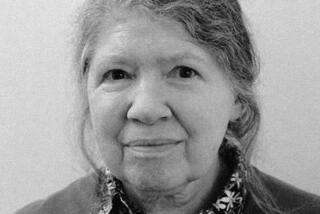BOOK REVIEW / AUTOBIOGRAPHICAL : A Barrister’s Slow-Motion Seduction by an Insistent Muse : MURDERERS AND OTHER FRIENDS: Another Part of Life <i> by John Mortimer</i> ; Viking $23.95, 261 pages
- Share via
“The Rumpole man” is how John Mortimer is addressed by an amiable but slightly bloodthirsty fellow who shows up in “Murderers and Other Friends,” the second volume of Mortimer’s autobiography--and, of course, that’s exactly how Mortimer is likely to be remembered.
But Mortimer, author of the beloved “Rumpole of the Bailey” series, is something more than a refined British counterpart to our Grisham or Turow. Although he is a former criminal defense attorney with an intimate knowledge of the peculiarly English style of crime and punishment, the fact remains that Mortimer is, above all, a man of letters who stumbled into the law--and then out again.
“I’d started in the schizoid business,” explains Mortimer, “of being a writer who had barristering as a day job and was never entirely sure what to do when I grew up.”
The memoir is haunted, almost literally, by the ghosts of Mortimer’s father, a blind man who practiced law only with the aid of the wife whom he also abused. Mortimer allows us to understand that his life and career can be explained by an impulse to follow in his father’s footsteps and an equal and opposite impulse to bolt and run in the other direction.
But “Murderers and Other Friends” is mostly devoted to a charming collection of anecdotes and asides that add up to the tale of Mortimer’s passage from barrister to author, playwright and screenwriter, a slow-motion seduction by an insistent muse who finally overcame his father’s influence.
So, at moments, Mortimer reminisces about his life in the courtrooms of the British Commonwealth. He explains the intricacies of the so-called Guardsman’s Defense, a ploy not entirely unlike the one adopted by the Menendez brothers; he introduces us to mercy killers and pornographers and political criminals; he invites us into murder trials, courts-martial and a series of obscenity, blasphemy and vice prosecutions against a gay newspaper, a punk band and a consignment of “battery-controlled penises of alarming dimensions.”
“It’s such an honor,” a young Russian poet once told Mortimer’s daughter, “to be walking across Red Square with a girl whose father defended the Sex Pistols.”
But, at other moments, Mortimer explains how he reinvented himself as a writer. And so he introduces us, too, to the actors, authors, directors, playwrights and other celebrities whom he came to count among his friends: Alec Guinness, Tony Richardson, Robert Graves and Harold Pinter, among many other famous names that are dropped here and there throughout the book, always in the context of a setting of a droll story.
“Of course Jesus Christ lived to the age of 80, went to China and discovered spaghetti,” says Graves during a backstage encounter in the West End theater where one of Mortimer’s plays was being staged.
“In which Gospel . . . do we learn that Jesus Christ discovered spaghetti?”
“In no Gospel,” says Graves. “It’s simply a matter of common knowledge.”
The crowning moment, of course, is the birth of Rumpole, who was conceived by Mortimer during a sojourn in a Moroccan hotel. Although he has written nearly 40 books, including “A Voyage Round My Father” and “Paradise Postponed,” he is resigned to the fact that Rumpole is likely to be his enduring literary legacy.
“I’d wanted to write about a detective, a Sherlock Holmes or a Maigret, to keep me alive in my old age,” he recalls. “I began by writing some odd speeches for him and found that as soon as he stepped onto the page, he began to speak in his own voice, which is undoubtedly the greatest favour a character can do for you.”
“Murderers and Other Friends” is an appealingly chatty book, as if Mortimer had allowed his mind to wander at random over a long and colorful career, picking and choosing the odd but always entertaining moment to share with us. And Mortimer refuses to apologize for his own passions and eccentricities, no matter how politically incorrect.
“It’s the purpose of the novelist, as it is of the defending barrister,” he says of himself, “to go on asking awkward questions.”
More to Read
Sign up for our Book Club newsletter
Get the latest news, events and more from the Los Angeles Times Book Club, and help us get L.A. reading and talking.
You may occasionally receive promotional content from the Los Angeles Times.







